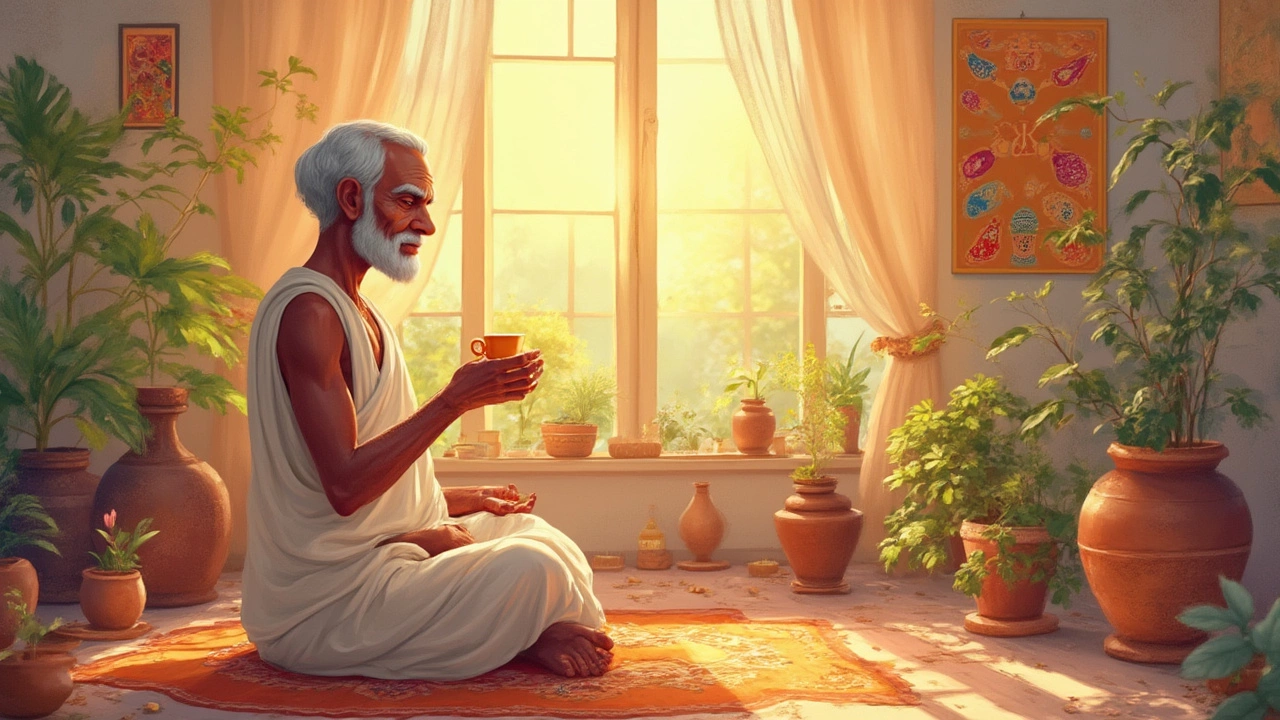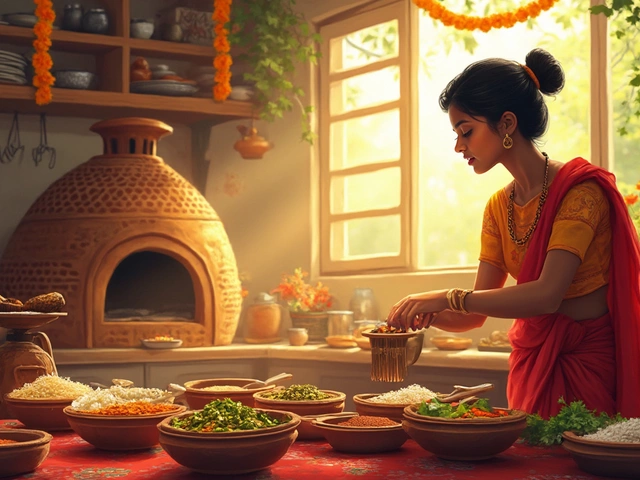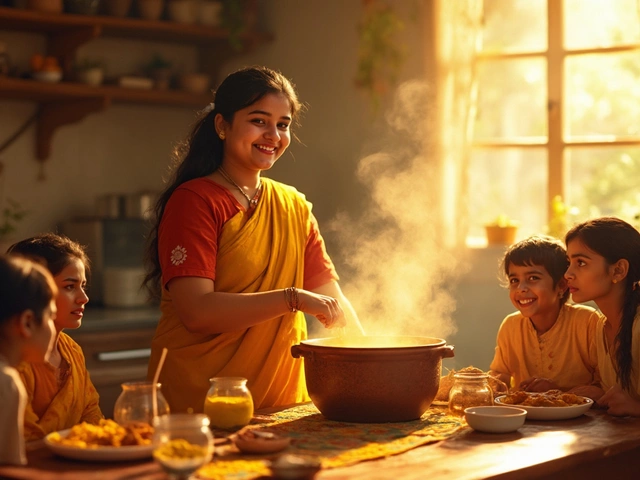Ever met someone who seems to have ideas zipping through their mind at lightning speed, jumps from one interest to the next, and sometimes forgets where they put their keys—five times a day? We're talking about ‘vata people’ in Ayurveda. These folks are anything but average. Vata, one of the three doshas (body types) in Ayurveda, is all about movement, change, and extremes. Honestly, vata personalities are a wild blend—equal parts creative spark and lovable forgetfulness. But what’s going on behind all that energy and unpredictability?
Recognizing the Vata Person: Traits, Body and Mind
Spotting someone with a dominant vata dosha isn’t that hard if you know what to look for. Think quick—quick talk, quick walk, quick to laugh, and yes, quick to worry. They’re often the first to start new projects but might lose interest before finishing. The classic vata body is slim, with either a delicate or irregular bone structure. Their joints can even crack when they move. Dry, cool skin and curly or frizzy hair—check. You might notice they get cold easily, pile on sweaters, and dread winter more than most.
But it’s not just about appearances. Vata minds are restless and inventive. These are the people who stay up dreaming about starting a bakery, composing a song, and learning pottery all in one night. Their mental energy is contagious—even a five-minute chat leaves you buzzing. Yet, they're forgetful. Ask a vata friend where your charger went, and you’ll get a blank stare before a sheepish grin. Scatterbrained? Sometimes. Endearing? Absolutely.
Vata emotions swing wildly. When things are good, it’s euphoria—when things go bad, it looks like worry, anxiety, or even panic. A 2016 study from All India Institute of Medical Sciences found that people with vata-dominant constitutions reported higher anxiety symptoms compared to pitta or kapha types. Changes in weather, routines, or even skipping lunch can tip a vata person into full-blown stress mode. Vatas actually thrive with structure—even if building a routine feels like solving a Rubik’s cube blindfolded.
Sleep is another quirky area. Vata folks can have vivid dreams, interrupted sleep, and trouble winding down. They might feel restless at night or wake up several times. If you gave them a sleep tracker, you'd see lots of tossing and turning. According to Ayurveda, this fits—vata’s main elements are air and space. It's like living with a breeze that never settles.
Table: Quick Glance at Vata Features
| Feature | Common Characteristics |
|---|---|
| Body Build | Light, thin, delicate, sometimes tall or very short |
| Skin | Dry, cool, rough, often thin, prone to chapping |
| Hair | Dry, frizzy, curly, sometimes scanty |
| Digestion | Irregular, sensitive, tendency for gas/bloating |
| Mental Traits | Creative, quick-witted, anxious, easily distracted |
| Energy | Burst of energy, then fatigue, easily overexerted |
| Sleep | Light, interrupted, sleeps less than 7 hours often |
So, if your best friend is a slim, cold-handed, restless soul who surprises you with hand-painted birthday cards and forgets your birthday party was even today—welcome to the vata world.

Daily Life: Habits, Challenges, and How Vata Shows Up
Living as a vata person can feel like a permanent rollercoaster. Mornings can start full of pep, but by noon, they’re staring into space daydreaming or starting a new side project. Efficient? Not always. Interesting? Every day! You’ll rarely see a vata desk with neat stacks of files. Instead, expect journals with unfinished poems, random sticky notes, and a cup of herbal tea that’s gone cold. Messy? Maybe, but it's organized chaos—at least, that’s what vata folks will swear by.
These people are movement junkies. Sitting in one place for more than an hour feels like punishment. They love walking, dancing, yoga, or anything that keeps the body engaged. But, their energy isn’t endless. After a burst of activity, vatas often crash. They need to rest and recharge, but often ignore this until their body practically begs for it. They’re prone to bouts of sudden fatigue and feeling ‘scattered’ or overwhelmed, especially after lots of social events or travel.
Speaking of travel, vatas are the wanderers of the dosha world. Give them a ticket to a new city, and they’ll come back with wild stories—along with lost luggage and a few mosquito bites. But new adventures can take a toll. Vata systems hate sudden changes, and nothing brings more uncertainty than travel. Ever noticed you catch colds, insomnia, or constipation after a long flight? That’s your vata going haywire. Even a simple missed meal can lead to crankiness or digestive trouble.
If food’s involved, vata people tend to forget regular meals but get intensely ‘hangry’ when they're finally reminded. Ayurveda suggests vata types do best with regular, grounding meals—think hearty stews, warm soups, rice, sweet fruits. Dry crackers for lunch? Disaster. Raw salads and iced water? Cue tummy aches and shivering.
Emotionally, vata people are sensitive souls. A harsh word or a scary movie stays with them for days. Their imagination brings beauty—but also worry. The upside? They’re wildly creative, often involved in arts, music, poetry, or social causes. No surprise: famous artists like Van Gogh and Virginia Woolf were classic vata types. Their greatest challenge—bringing all that imaginative energy down to earth. They know time management is important, but sticking to a schedule is a real challenge.
There's a term in Ayurveda—‘vata derangement.’ It sounds dramatic, but it means what happens when vata energy goes out of balance. Symptoms can be weird and random: twitching eyelids, cracked lips, racing thoughts, insomnia, rough skin, sudden chills, or even an odd craving for sweet or oily foods. When that happens, an easy recipe for a reset is to slow down, eat something warm, get a massage, and just breathe.
Real-life tip: If you’re a vata type, carry a little schedule card—yes, an actual paper one. Check in with it three times a day. Anchor yourself with routines and rituals, like drinking a warm cup of milk before bed or taking ten minutes to just listen to calming music.

Finding Balance: Ayurvedic Advice and Self-Care for Vata Types
So, how do you help this creative tornado stay grounded? Ayurveda’s advice isn’t just ancient poetry—it’s surprisingly practical. The basic rule: vata person thrives with warmth, regularity, and oiliness. The trick is to add what vata lacks (warmth, moisture, stability) and avoid what makes things worse (cold, dryness, chaos).
Start with food. Vata types often skip meals, but regular eating is non-negotiable. Focus on warm, cooked, oily foods—think of a fragrant bowl of rice kitchari or a slow-cooked vegetable curry. Chilled salads and smoothies? Reserve for summer, if at all. Ayurveda also swears by herbal teas like ginger, cinnamon, or licorice root. If you want a simple comfort meal: cook oats in milk, add ghee and a bit of jaggery. Evenings are the best time for calming teas—say goodnight to those jumpy nerves.
Next, routine. If you’re a vata person, you need to make routines sacred. Wake up, eat, and sleep at roughly the same time—every day. Yeah, it sounds boring, but your body will thank you. Splash your face and hands with warm water when you wake up or after coming home. Try self-massage—Ayurveda recommends massaging your body with sesame oil before a warm shower at least twice a week. It sounds indulgent, but it boosts circulation and calms flighty nerves better than any spa day.
Exercise is great, but go slow and steady. Yoga, tai chi, gentle walking, or swimming are perfect. Avoid extreme, high-intensity anything. When energy is low, listen to your body—rest, don’t push. Meditation and breathwork (like alternate nostril breathing) really help bring that scattered mind to center.
Bedtime is prime for vata self-care. Create a wind-down routine: dim the lights, soak your feet in warm water, read a light (not scary!) book, or hum your favorite lullaby. Heavy, woolen blankets and a warm drink are vata’s best friends once the sun goes down.
Socially, vatas need to avoid burnout. Too many parties or stressful talks? Downtime is crucial. Let those around you know—sometimes you need your ‘cave time’ more than a night out. Creative hobbies are a double-edged sword for vata; they're amazing but can fill your plate with too many side projects. Tackle one creative project at a time and see it through; you’ll feel less frazzled and more fulfilled.
Quick tips to keep Vata balanced:
- Eat three warm, nourishing meals daily.
- Establish a sleep schedule and stick to it—aim for 7-8 hours each night.
- Moisturize skin and scalp with natural oils.
- Choose calming, steady activities over unpredictable, high-tempo stuff.
- Limit screen time close to bedtime.
- Spend time in nature—gentle walks, soaking up the sunshine, feeling grounded.
The magic of Ayurveda is that it doesn’t just accept ‘who you are’—it helps you thrive by making practical tweaks. Vata types need to ground themselves in warmth, routine, and self-care, so their electric creativity doesn’t burn them out. It’s not about changing your essence—just learning how to keep your amazing, whirlwind self on track. If the world needs more passionate inventors, dreamers, and wild ideas, then we definitely need more happy, balanced vata people.





